Here’s the officially reported coronavirus death toll through March 6. The raw data from Johns Hopkins is here.
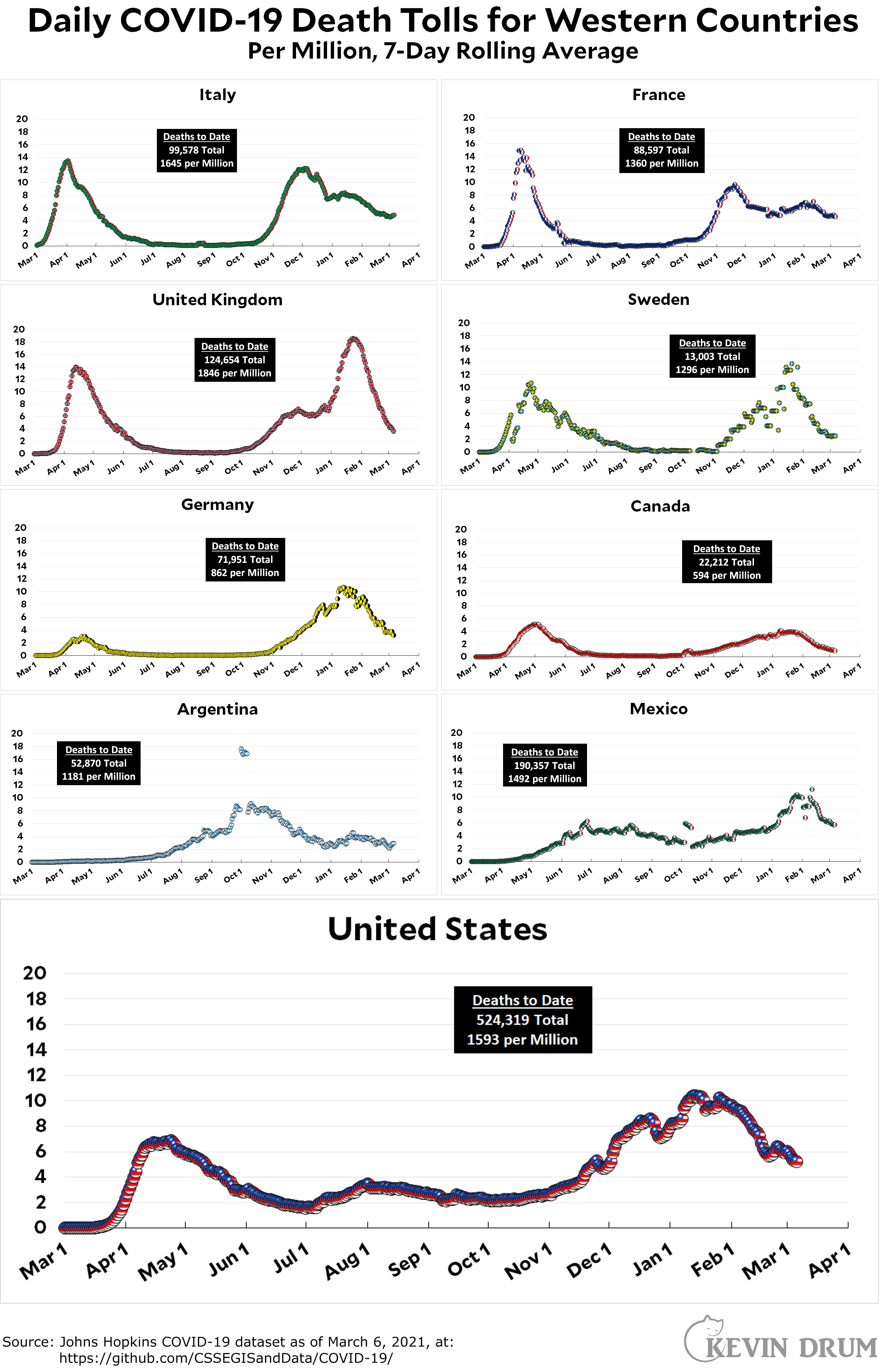
Cats, charts, and politics

Here’s the officially reported coronavirus death toll through March 6. The raw data from Johns Hopkins is here.

Hum de hum. It's Saturday so let's piss everyone off.
For starters, I will stipulate up front that I mostly disagree with everything that Joe Manchin and Kyrsten Sinema have demanded in order to win their votes for the American Rescue Plan. (The only exception is the $15 minimum wage, which I'm mildly against since I think it ought to be more like $12 or so.)
But.
Everyone knew this was coming. All the wise heads on Twitter and elsewhere have spent the past couple of months warning everyone that Democrats have precisely 50 senators and that means legislation has to satisfy the 50th most liberal Democrat. There's no way the coronavirus bill was going to be a Bernie Sanders wet dream. What's more, Joe Biden ran explicitly as a fairly moderate guy, and there's no reason to expect him to govern otherwise.
Under the circumstances, we did pretty damn well! A $1.9 trillion bill, regardless of the tweaks that Manchin demanded, is a helluva thing—especially given its generally strong focus on lower incomes. And overall, Biden has turned out to be considerably more progressive than we expected.
And yet, an awful lot of progressives have insisted on absolutely reaming Manchin and Sinema for their (admittedly sometimes performative) objections to the bill. We did the same thing to Susan Collins last year, and it sort of looks like we might be planning to do it to Lisa Murkowski sometime soon.
This is insane. These folks just aren't super progressive and we all know it. They are potential allies in certain cases, and the best way to keep them that way is to persuade them to join us, not to piss them off every time they disappoint us. Politics aside, human nature is what it is: If you attack someone viciously, they are more likely to oppose you in the future because they hate your guts.
So for chrissake, knock it off. Throw things at the TV set if you must, and complain all you like in private. In public, though, keep the complaints relatively mild, and couple them with hopes that we can win their votes in the future. I fully understand how galling this seems, but if you want to win, this is the one of the prices you have to pay.
Here’s the officially reported coronavirus death toll through March 5. The raw data from Johns Hopkins is here.
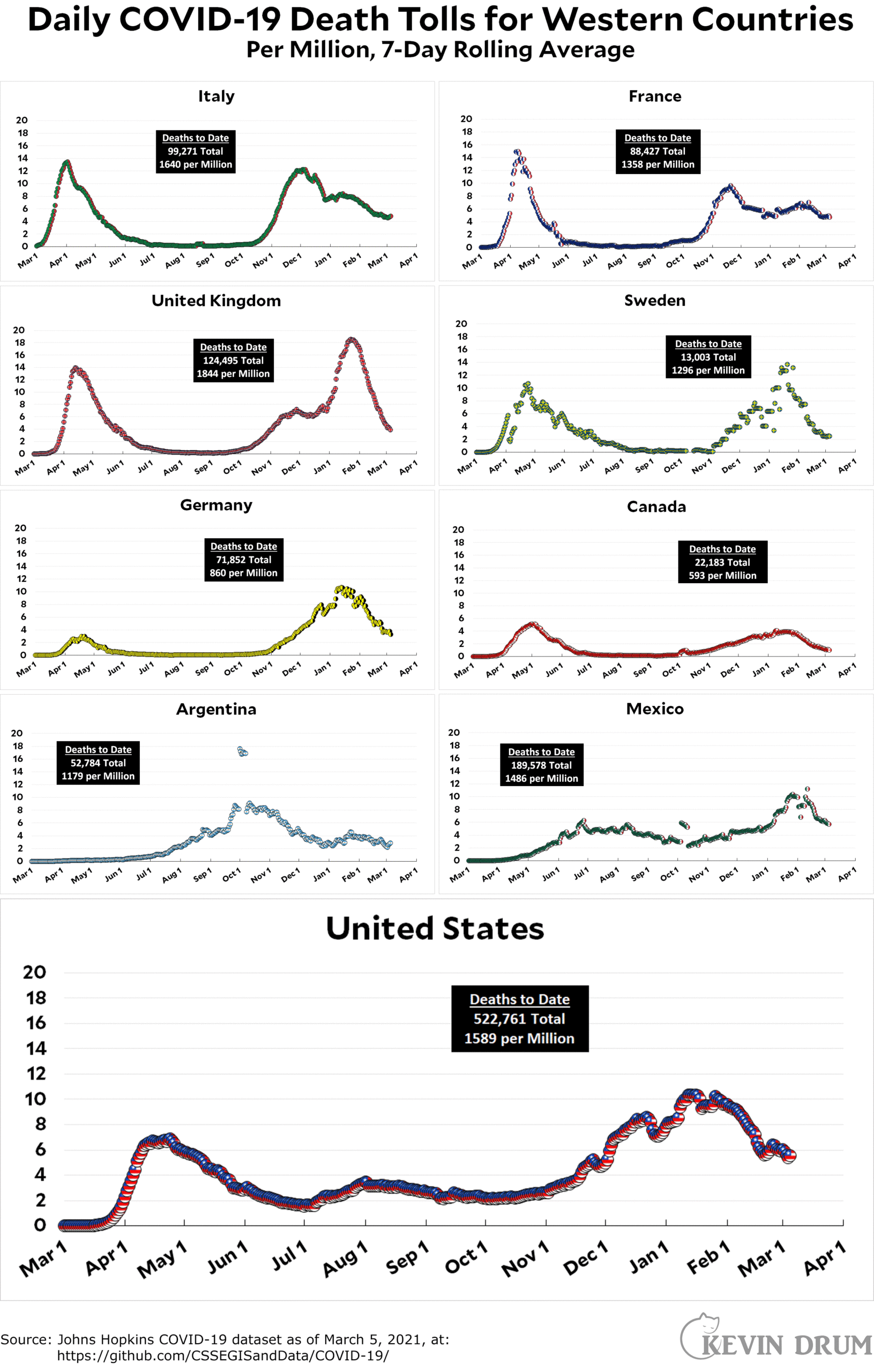
Hopper's favorite new place is on the back of my new chair—or on the back of our old couch. I guess she just likes being up high where she can keep an eye on things. Here she is posing with Marian.

One of the lesser known provisions of the $1.9 trillion coronavirus bill is a "temporary" expansion of Obamacare subsidies:
The American Rescue Plan spends $34 billion expanding the Affordable Care Act subsidies for two years. The changes would make upper-middle-income Americans newly eligible for financial help to buy plans on the Obamacare marketplaces, and would increase the subsidies already going to lower-income enrollees.
Subsidies would be increased for the poor and working class while the "subsidy cliff" for higher-income families would be abolished. Instead of federal subsidies ending suddenly at 400% of the poverty level (about $85,000 for a family of three), they would continue for people at all income levels, who would be limited to paying 8.5% of their income for health coverage.
The subsidy cliff has—quite fairly—spawned endless complaints from middle-class families, and for them this change would be gigantic. Today, if you make $85,000 and your health coverage costs $25,000, then you have to pay $25,000. Under the new plan, your maximum payment is about $7,000. In other words, your subsidy has gone from zero to $18,000.
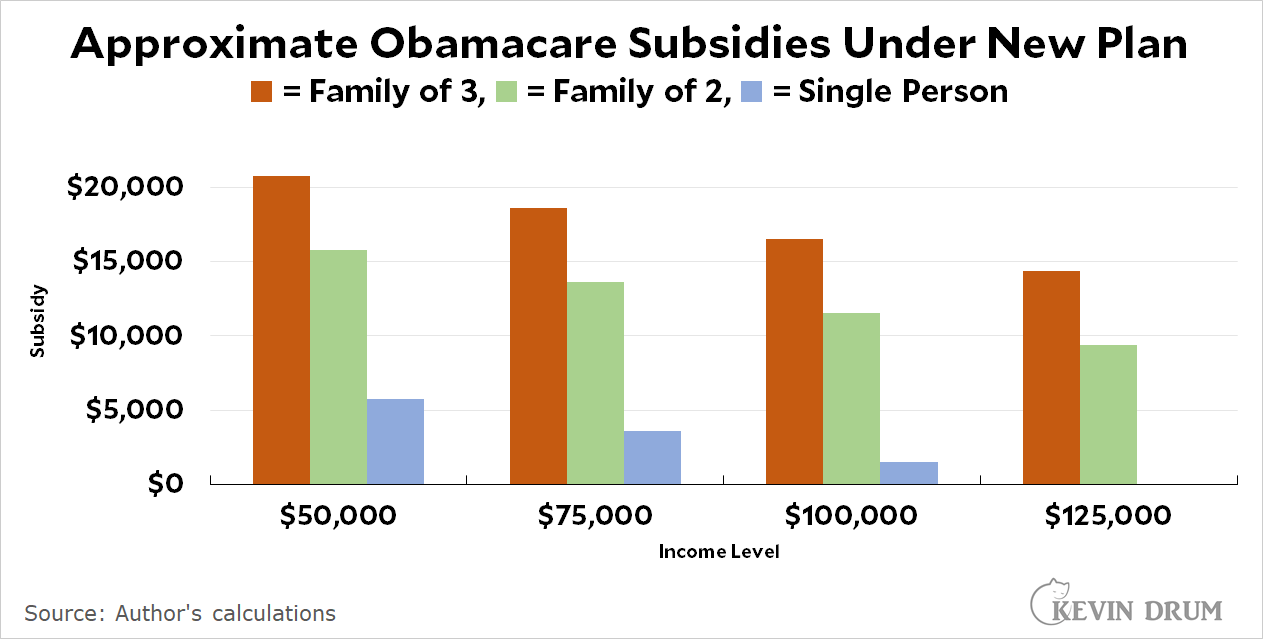
This change has spawned surprisingly little pushback from conservatives, though last month the Wall Street Journal noted—correctly—that "The politics are such that the benefit will never be revoked." Probably so! The Journal also offered up the tired complaint that even a few very well-off families would get some subsidy money, but their heart wasn't in it since, after all, their core audience is the very well off. It was just a pro forma gripe.
On the other side of the aisle progressives are naturally disappointed that we aren't getting Medicare for All, but that was a pipe dream. There were never enough votes for M4A even if President Biden had supported it. Instead, what's likely to happen to Obamacare is the same thing that happened throughout Europe over the last century. Very few countries introduced full-on national health care in a single swoop. Instead, they passed limited programs and then expanded them steadily until, eventually, they were all but universal. And in every case there was lots of path dependence: improvements were all based on the existing system rather than uprooting the entire thing and starting over.
This is almost certainly how things will happen here too. Obamacare built on Medicaid and private insurance because that's what we already had. Biden is now building on that. Most likely, we'll eventually end up like Switzerland, which relies mostly on subsidies for private insurance, rather than, say, the system used in Sweden or France.
Is this the most efficient way of doing things? Nope. Then again, making Medicare universal isn't the most efficient way of covering everyone either. In any case, this is a big change, and it's especially a big change for the middle class, which progressives should pay a lot more attention to. This has been a huge pain point for many of them, and it's about to go away.
POSTSCRIPT: The big question now is whether Democrats will brag loudly about this. They should! It's a big new benefit for a lot of middle-class families.
Alternatively, centrists will be too timid to talk about something that costs a lot of money, and progressives will sulk in their tents because it isn't Medicare for All. It would be nice to avoid that this time around.
The coronavirus bill is going through a round of amendments in the Senate, and one of the changes is weirdly complex enough that I didn't understand it at first. Luckily David Dayen does:
According to a Democratic aide, the amendment would roll back the federal boost from $400/month to $300/month. It would also extend benefits through September, adding back that month that the House chopped off. And it would make the first $10,200 of unemployment benefits exempt from taxes in the 2020 tax year. If you got the $600 federal boost for the maximum period allowable in 2020, it would add up to $10,200, so that’s where they got that number. All of the federal boost would be tax-free, then.
So, um, sure, I guess. As David says, this jiggery pokery is because the Democratic budget resolution sets the maximum price tag for this bill at $1.9 trillion, so if you add something in one place you have to reduce it in another. I suppose we can expect more of this stuff as the day wears on.
The American economy gained 379,000 jobs last month. The unemployment rate declined slightly to 6.2 percent. As usual, I’d caution everyone about interpreting these figures since they say more about the COVID-19 pandemic than the actual jobs situation.
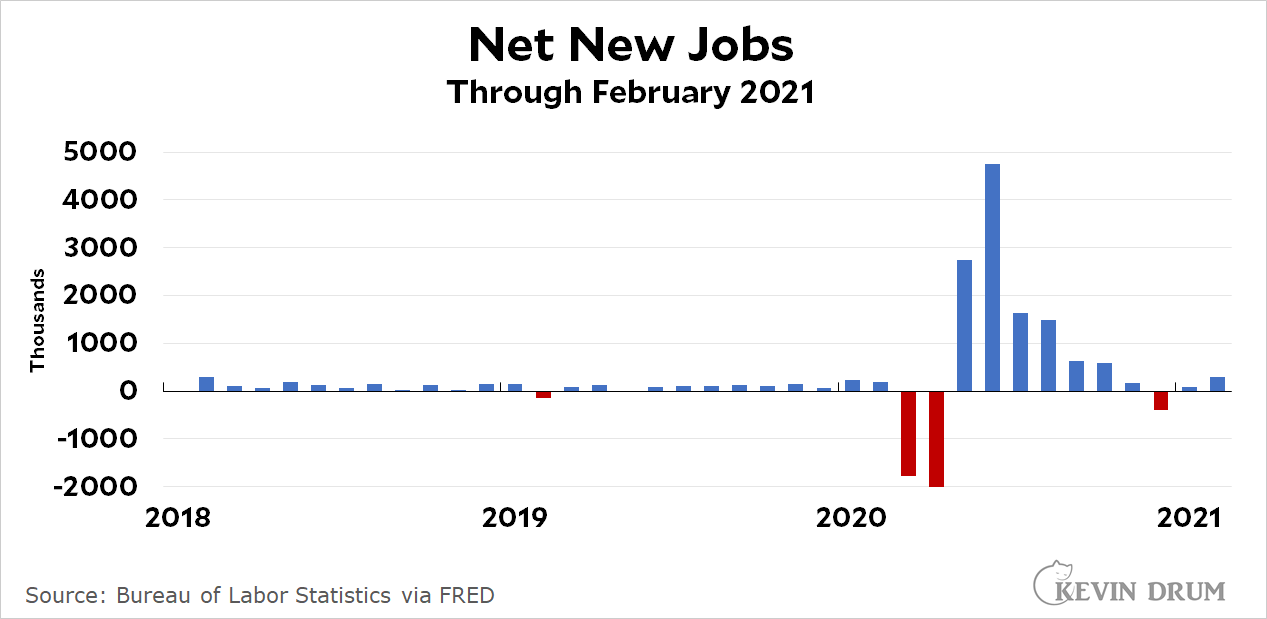
Here’s the officially reported coronavirus death toll through March 4. The raw data from Johns Hopkins is here.
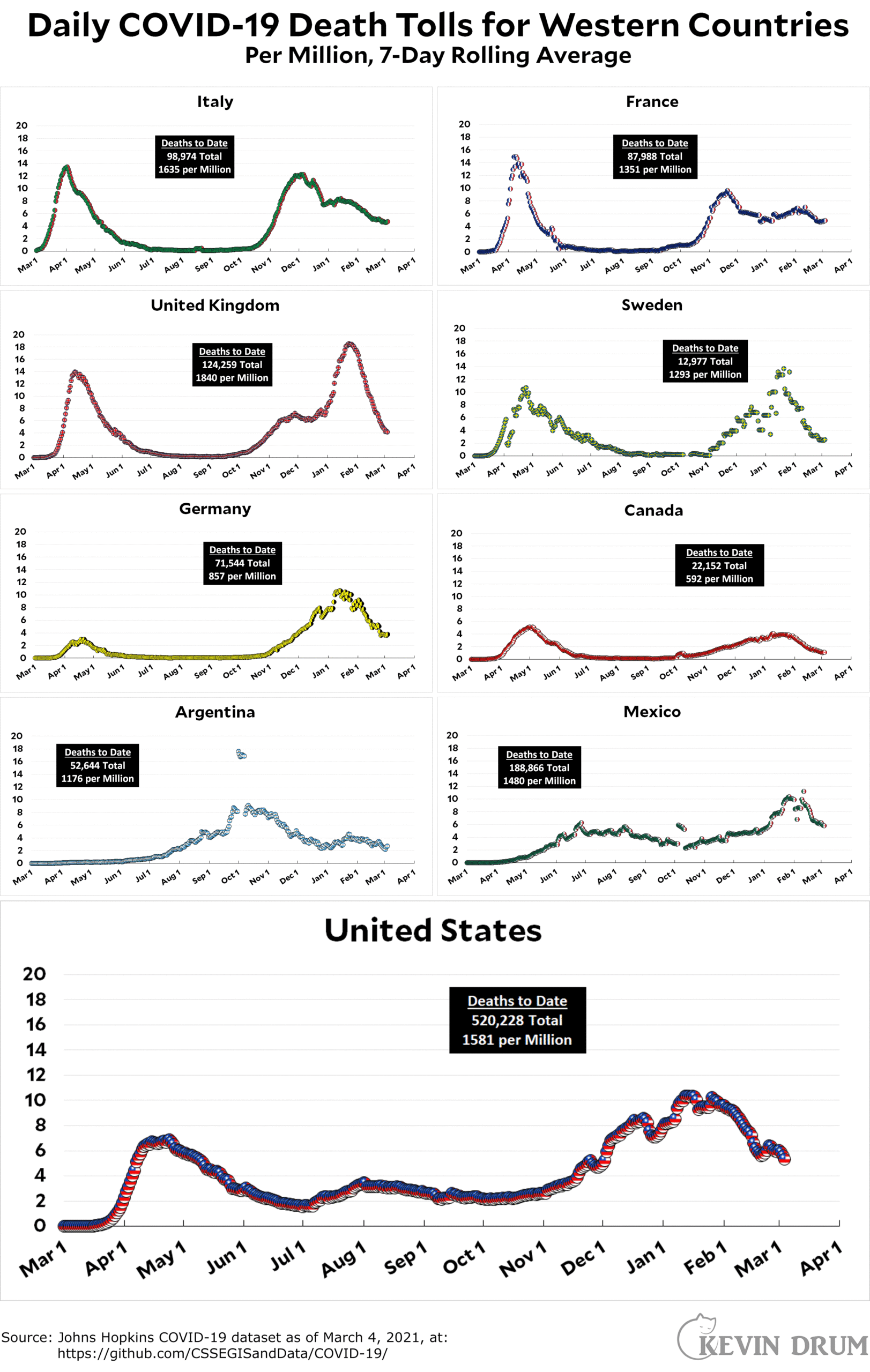
Marco Rubio responded today to President Biden's comment that reopening states too early is "neanderthal thinking":
President Biden’s use of an old stereotype is hurtful to modern Europeans, Asians & Americans who inherit about 2% of their genes from Neanderthal ancestors. https://t.co/aXHJV5wLlr
He should apologize for his insensitive comments and seek training on unconscious bias.
— Marco Rubio (@marcorubio) March 4, 2021
Unless I've lost my sense of humor completely, I assume this is a joke. Why are so many people treating it otherwise?
Luckily for everyone, this UPS plane decided not to follow the arrows to San Diego.
